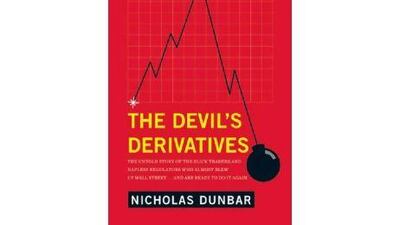Review: The Devil's Derivatives: The Untold Story of the Slick Traders and Hapless Regulators Who Almost Blew Up Wall Street … and Are Ready to Do It Again, by Nicholas Dunbar
Q&A: At the risk of sounding ...
Is there a non-devilish explanation for why banks and hedge funds use derivatives? In theory, derivatives allow for the stripping out of risk from a transaction, such as interest rate or currency volatility. The idea is to reduce the impact of unexpected events on the smooth running of a business. But Dunbar argues that the mathematical modelling of rocket scientists and PhD mathematicians left many investment banks complacent about the potential risks that ultimately exploded in the financial crisis of 2008. Since then, western governments have beefed up regulation of this industry.
But I only use a bank as a place to hold a savings account to park my cash. Why should I care about derivatives? Derivatives, when they explode, often leave a terrible mess – forcing governments to foot the bill for bank bailouts and leaving less cash available for spending on other programmes. Take Abu Dhabi Commercial Bank: having bought into a structured investment vehicle that collapsed in 2005, the bank has been nursing provisions ever since.
The world of credit derivatives is perhaps the most fiendishly complex aspect of the financial crisis, a minefield of numbers.
And yet few authors have tried to explain the workings of this catastrophe-prone industry to the layman - until now.
The flaws within this industry, worth hundreds of trillions of dollars, are laid bare in The Devil's Derivatives.
If the title sounds like a pantomime, the tale told is rather more tragic. The book has an expert guide in author Nicholas Dunbar, a financial journalist who covered derivatives for the trade press long before they caught the public's attention.
Dunbar leads the reader through the development of the industry over two decades, when western banks and companies lapped up the complex derivatives. They were fed to them by slick investment bankers, culminating in the financial crisis of 2007 and the collapse of Lehman Brothers a year later.
He follows the paper trail that started with cash-strapped American home owners who, in the past, would never have been deemed creditworthy to borrow money for a mortgage.
He then looks at the risk-loving western investment bankers, who bundled these mortgages into sophisticated derivative products, and sold them on as safe assets. Along the way are detailed allegations of mis-selling of collateralised debt obligations and subprime mortgages by banks to buyers such as Poste Italiane, LB Kiel and Abu Dhabi Commercial Bank. The book written in a punchy prose that is easy to understand, is a triumphant romp through a decade of financial mismanagement. A must-read.
Top 5: Business books at Waterstone’s UK
1 Steve Jobs: The Exclusive Biography (Walter Isaacson)
2 The Way I See it: Rants, Revelations and Rules for Life (Alan Sugar)
3 What You See Is What You Get: My Autobiography (Alan Sugar)
4 23 Things They Don't Tell You About Capitalism (Ha-Joon Chang)
5 Boomerang: The Meltdown Tour (Michael Lewis)
The Quote: What started out as an arcane twist of high finance – derivatives – has now corrupted the entire financial world - Nicholas Dunbar
twitter: Follow our breaking business news and retweet to your followers. Follow us

